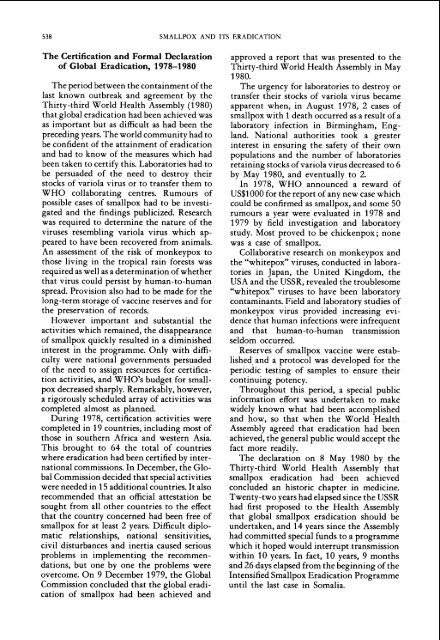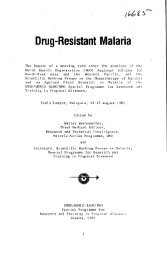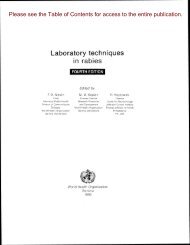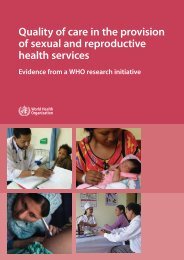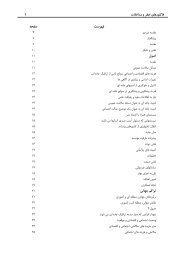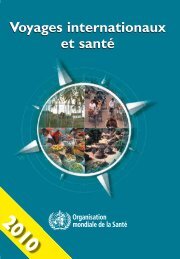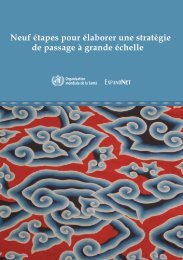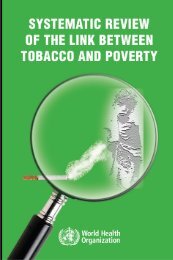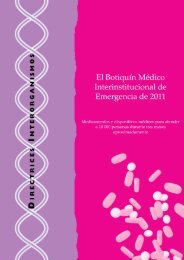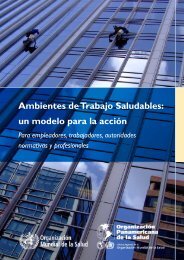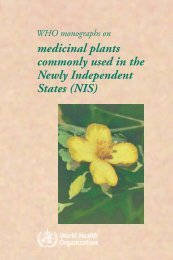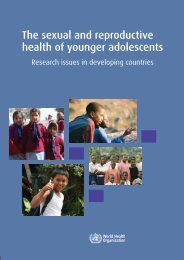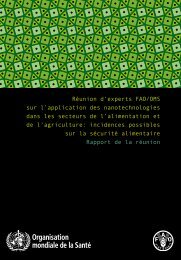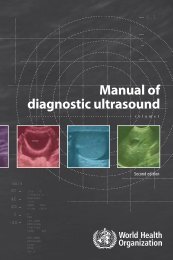smallpox eradication - libdoc.who.int - World Health Organization
smallpox eradication - libdoc.who.int - World Health Organization
smallpox eradication - libdoc.who.int - World Health Organization
You also want an ePaper? Increase the reach of your titles
YUMPU automatically turns print PDFs into web optimized ePapers that Google loves.
538 SMALLPOX AND ITS ERADICATION<br />
The Certification and Formal Declaration<br />
of Global Eradication, 1978-1980<br />
The period between the containment of the<br />
last known outbreak and agreement by the<br />
Thirty-third <strong>World</strong> <strong>Health</strong> Assembly (1980)<br />
that global <strong>eradication</strong> had been achieved was<br />
as important but as difficult as had been the<br />
preceding years. The world community had to<br />
be confident of the attainment of <strong>eradication</strong><br />
and had to know of the measures which had<br />
been taken to certify this. Laboratories had to<br />
be persuaded of the need to destroy their<br />
stocks of variola virus or to transfer them to<br />
WHO collaborating centres. Rumours of<br />
possible cases of <strong>smallpox</strong> had to be investigated<br />
and the findings publicized. Research<br />
was required to determine the nature of the<br />
viruses resembling variola virus which appeared<br />
to have been recovered from animals.<br />
An assessment of the risk of monkeypox to<br />
those living in the tropical rain forests was<br />
required as well as a determination of whether<br />
that virus could persist by human-to-human<br />
spread. Provision also had to be made for the<br />
long-term storage of vaccine reserves and for<br />
the preservation of records.<br />
However important and substantial the<br />
activities which remained, the disappearance<br />
of <strong>smallpox</strong> quickly resulted in a diminished<br />
<strong>int</strong>erest in the programme. Only with difficulty<br />
were national governments persuaded<br />
of the need to assign resources for certification<br />
activities, and WHO'S budget for <strong>smallpox</strong><br />
decreased sharply. Remarkably, however,<br />
a rigorously scheduled array of activities was<br />
completed almost as planned.<br />
During 1978, certification activities were<br />
completed in 19 countries, including most of<br />
those in southern Africa and western Asia.<br />
This brought to 64 the total of countries<br />
where <strong>eradication</strong> had been certified by <strong>int</strong>ernational<br />
commissions. In December, the Global<br />
Commission decided that special activities<br />
were needed in 15 additional countries. It also<br />
recommended that an official attestation be<br />
sought from all other countries to the effect<br />
that the country concerned had been free of<br />
<strong>smallpox</strong> for at least 2 years. Difficult diplomatic<br />
relationships, national sensitivities,<br />
civil disturbances and inertia caused serious<br />
problems in implementing the recommendations,<br />
but one by one the problems were<br />
overcome. On 9 December 1979, the Global<br />
Commission concluded that the global <strong>eradication</strong><br />
of <strong>smallpox</strong> had been achieved and<br />
approved a report that was presented to the<br />
Thirty-third <strong>World</strong> <strong>Health</strong> Assembly in May<br />
1980.<br />
The urgency for laboratories to destroy or<br />
transfer their stocks of variola virus became<br />
apparent when, in August 1978, 2 cases of<br />
small~ox with 1 death occurred as a result of a<br />
laboratory infection in Birmingham, England.<br />
National authorities took a greater<br />
<strong>int</strong>erest in ensuring the safety of their own<br />
populations and the number of laboratories<br />
retaining stocks of variola virus decreased to 6<br />
by May 1980, and eventually to 2.<br />
In 1978, WHO announced a reward of<br />
US81 000 for the report of any new case which<br />
could be confirmed as <strong>smallpox</strong>, and some 50<br />
rumours a year were evaluated in 1978 and<br />
1979 by field investigation and laboratory<br />
study. Most proved to be chickenpox; none<br />
was a case of small~ox.<br />
Collaborative research on monkeypox and<br />
the "whitepox" viruses, conducted in laboratories<br />
in Japan, the United Kingdom, the<br />
USA and the USSR. revealed the troublesome<br />
"whitepox" viruses to have been laboratory<br />
contaminants. Field and laboratory studies of<br />
monkeypox virus provided incrkasing evidence<br />
that human infections were infrequent<br />
and that human-to-human transmission<br />
seldom occurred.<br />
Reserves of smallvox vaccine were established,<br />
and a protocdl was developed for the<br />
periodic testing of samples to ensure their<br />
continuing potency.<br />
Throughout this period, a special public<br />
information effort was undertaken to make<br />
widely known what had been accomplished<br />
and how, so that when the <strong>World</strong> <strong>Health</strong><br />
Assembly agreed that <strong>eradication</strong> had been<br />
achieved, the general public would accept the<br />
fact more readily.<br />
The declaration on 8 May 1980 by the<br />
Thirty-third <strong>World</strong> <strong>Health</strong> Assembly that<br />
smallvox <strong>eradication</strong> had been achieved<br />
concluded an historic chapter in medicine.<br />
Twenty-two years had elapsed since the USSR<br />
had first proposed to the <strong>Health</strong> Assembly<br />
that global <strong>smallpox</strong> <strong>eradication</strong> should be<br />
undertaken, and 14 years since the Assembly<br />
had committed special funds to a programme<br />
which it hoped would <strong>int</strong>errupt transmission<br />
within 10 years. In fact, 10 years, 9 months<br />
and 26 days elapsed from the beginning of the<br />
Intensified Smallpox Eradication Programme<br />
until the last case in Somalia.


